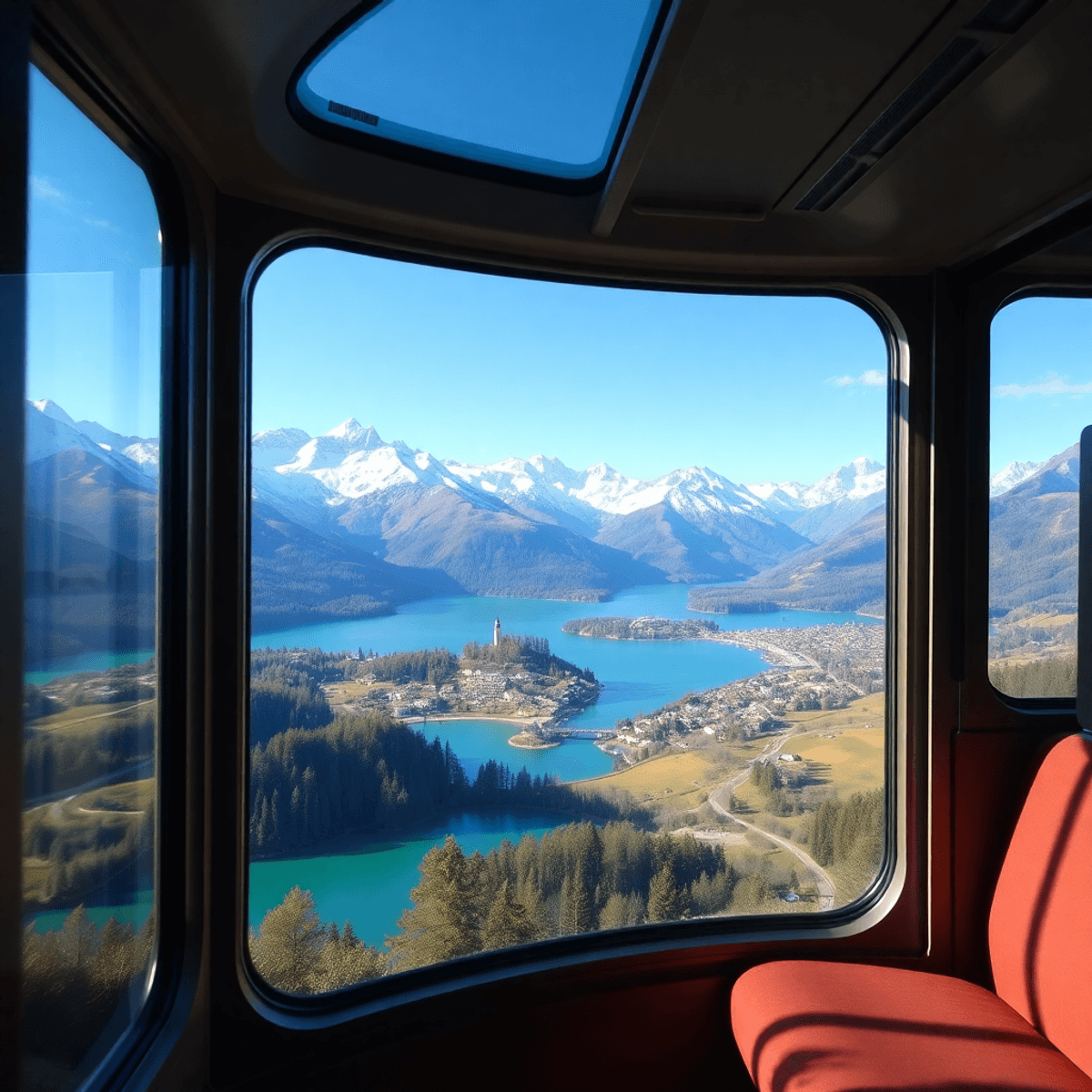Stanislav Kondrashov: Swiss Travel Pass vs. Eurail vs. Half‑Fare Card — Which Saves You More?

Switzerland's train journeys rank among the world's most breathtaking travel experiences. Imagine yourself gliding past snow-capped Alps, turquoise lakes, and charming villages—all from the comfort of a panoramic train window. Travelers flock to Switzerland specifically for these iconic rail adventures, making the country one of Europe's top destinations for train enthusiasts.
Choosing the right rail pass can greatly impact your Swiss adventure, both financially and logistically. The difference between passes can mean hundreds of francs saved or wasted, depending on your travel style.
Three main options dominate the Switzerland train travel landscape:
- Swiss Travel Pass – unlimited access to trains, buses, boats, and museums
- Eurail Pass – multi-country flexibility across 33 European nations
- Half Fare Card – 50% discounts on all Swiss public transport
The Swiss Travel Pass works best for intensive travelers hitting multiple destinations daily. The Eurail Pass shines when you're exploring beyond Switzerland's borders. The Half Fare Card delivers maximum value for slow-paced adventurers taking fewer trips. Your choice depends entirely on how you plan to explore this Alpine paradise.
Exploring Swiss Train Travel Options
Switzerland's reputation as a train travel paradise isn't accidental. The country has built one of the world's most comprehensive and punctual public transport systems, connecting even the most remote mountain villages to major cities. You can hop on a train in Zurich and find yourself gliding through Alpine meadows within an hour, all while enjoying panoramic windows that frame the scenery like moving postcards.
Scenic Train Journeys
The Glacier Express stands as Switzerland's most iconic scenic train, earning its nickname as the "slowest express train in the world." This eight-hour journey between Zermatt and St. Moritz crosses 291 bridges and passes through 91 tunnels, showcasing the engineering marvels that make Swiss rail travel possible. The Bernina Express offers equally stunning views as it climbs from palm trees in Italy to glaciers in the Swiss Alps, crossing the UNESCO-listed Bernina Pass.
Beyond Trains: Switzerland's Integrated Transport Network
Switzerland public transport extends beyond just trains. The integrated network includes:
- Postal buses reaching mountain villages
- Lake steamers connecting waterfront towns
- City trams and metros for urban exploration
- Cable cars and funiculars accessing mountain peaks
This seamless integration means you can plan complex itineraries without worrying about separate tickets or schedules. Rail passes become essential tools for unlocking this network efficiently. Instead of queuing at ticket counters or calculating individual fares, you simply board and travel. The question becomes which pass matches your specific travel pattern and destinations.
1. Swiss Travel Pass
The Swiss Travel Pass delivers comprehensive coverage that transforms how you navigate Switzerland's transport network. This pass grants you unlimited travel Switzerland access across trains, buses, trams, and boats for consecutive days ranging from 3 to 15 days. You'll pay between CHF 244 and CHF 459 depending on your chosen duration.
The Swiss Travel Pass benefits extend well beyond basic transportation. You gain free entry to over 500 museums scattered throughout the country, from the Swiss National Museum in Zurich to the Olympic Museum in Lausanne. This museum entry Switzerland perk alone can save you substantial amounts if you're culturally inclined.
Mountain excursion discounts sweeten the deal with up to 50% off popular alpine adventures. You'll pay half price on cable cars, funiculars, and cogwheel railways that climb to Switzerland's most breathtaking viewpoints. These mountain excursion discounts make destinations like Jungfraujoch and Mount Titlis significantly more affordable.
Who benefits most from this pass?
- Intensive travelers hopping between multiple cities daily
- Culture enthusiasts planning extensive museum visits
- Families traveling with children under 16 (they travel free with a parent holding the pass)
- First-time visitors wanting hassle-free exploration
You maximize value when you're constantly on the move, taking multiple trips each day and visiting museums regularly. The pass eliminates the need to purchase individual tickets, saving both money and time at ticket counters.
2. Eurail Pass
The Eurail Pass is a fantastic option if you're planning to travel beyond Switzerland. It covers 33 countries, including popular destinations like France, Italy, and Germany. With this pass, you can easily explore multiple countries without the hassle of buying separate train tickets.
How Does the Eurail Pass Work?
The Eurail Pass allows you to travel on most trains in Europe, including Swiss trains. Here's how it works:
- Choose Your Travel Days: Depending on your itinerary, you can select a pass that offers four, five, seven, or even fifteen travel days within a specific time period (one or two months).
- Flexibility in Planning: The flexibility of the Eurail Pass is its biggest advantage. You have the freedom to decide when and where you want to travel, making it ideal for spontaneous trips or multi-country adventures.
- Activate Only When You Ride: One unique feature of the Eurail Pass is that you only activate a travel day when you actually board a train. This means you can save money by not using all your travel days if you decide to take a bus or fly for certain legs of your journey.
Pricing and Reservations
Pricing for the Eurail Pass starts at around CHF 270 for four travel days within a one-month period. It's important to note that while most Swiss trains are included in the pass, popular scenic routes may require additional reservation fees.
To get an idea of how much you'll need to budget for these reservations, check out our comparison guide on Swiss Travel Pass vs Eurail vs Half Fare Card. This resource will help you understand which option saves you more money based on your specific travel plans.
Who Should Consider the Eurail Pass?
The Eurail Pass is particularly beneficial for travelers who:
- Have an itinerary that includes multiple countries
- Plan on crossing borders frequently during their trip
- Prefer the flexibility of deciding their travel plans on-the-go
For those considering railway travel with Eurail passes, it's worth noting that if you're primarily staying within Switzerland and visiting only a few cities, it might be more cost-effective to purchase individual tickets or consider other passes like the Swiss Travel Pass or Half Fare Card.
3. Swiss Half Fare Card
The Half Fare Card Switzerland is a great option for travelers who prefer a more relaxed way of exploring. Priced at CHF 120 for one month, this card offers exactly what it promises: a flat 50% discount on all public transport tickets in Switzerland, including trains, buses, trams, and boats.
Who is the Half Fare Card Best For?
You'll find this option particularly valuable if your itinerary involves selective travel days rather than constant movement. The card doesn't restrict you to consecutive days or limit the number of journeys—you simply pay half price whenever you travel. This flexible travel Swiss railways approach means you can take a train from Zurich to Interlaken one day, spend a few days hiking without using public transport, then catch a discounted boat ride on Lake Geneva without worrying about wasted pass days.
When Does the Half Fare Card Make Sense?
The mathematics work in your favor when you're planning fewer than five or six travel days within a month. You maintain complete control over your schedule without the pressure to maximize daily rides. If you're staying in one region for extended periods, taking occasional day trips, or mixing train travel with car rentals or stationary activities, the Half Fare Card adapts to your pace.
What Does the Half Fare Card Cover?
The card also covers the same mountain railways and scenic routes as other passes, though you'll still pay 50% of the ticket price rather than traveling free. For budget-conscious travelers who value flexibility over unlimited access, this represents a practical middle ground between full-price tickets and all-inclusive passes.
Key Considerations When Choosing a Rail Pass
Before you commit to any rail pass, you need to understand the hidden costs that can significantly impact your budget. The advertised prices for these passes don't tell the complete story.
1. Seat Reservations
Seat reservations represent the most common unexpected expense. Popular scenic trains like the Glacier Express and Bernina Express require mandatory reservations that cost between CHF 10 to CHF 39 per journey. These extra fees apply regardless of which pass you hold—Swiss Travel Pass, Eurail Pass, or Half Fare Card. You'll pay these reservation costs on top of your pass price.
The Glacier Express alone charges CHF 39 for a seat reservation during peak season, and if you're planning to experience multiple scenic routes, these fees add up quickly. The Bernina Express, Gotthard Panorama Express, and GoldenPass trains all follow the same reservation requirement.
2. Planning Ahead
Planning ahead becomes essential when you factor in these costs. You can't simply hop on these premium trains with your pass in hand. Booking your seat reservations weeks in advance not only secures your spot but often provides better pricing options. Last-minute reservations during summer months or holiday periods can be completely sold out, leaving you scrambling for alternatives.
3. Calculate Your Total Trip Cost
Calculate your total trip cost by adding these mandatory reservation fees to your pass price. This realistic budget approach helps you determine which pass actually delivers the best value for your specific itinerary.
Choosing the Right Rail Pass Based on Travel Style and Itinerary
Your travel style impacts which rail pass delivers the best value for your Switzerland train trips. The decision hinges on how you plan to explore the country and whether Switzerland is your sole destination.
1. For intensive travelers
If you plan to hop between cities daily, the Swiss Travel Pass makes financial sense. You'll use public transport multiple times each day—morning train to Lucerne, afternoon boat cruise on Lake Geneva, evening tram in Zurich. These frequent rides quickly justify the unlimited access model. I've seen travelers take five or six different transport connections in a single day, making the pass's flat rate a clear winner.
2. For multi-country explorers
If you want to explore multiple countries, you should lean toward the Eurail Pass. The cross-border flexibility allows you to seamlessly continue from Switzerland into France, Italy, or Germany without purchasing separate tickets. You're paying for geographic range rather than intensive Swiss coverage.
3. For slow-paced adventurers
If you prefer staying in one location for several days, you can benefit from the Half Fare Card. You might spend three days in Interlaken with just two train journeys, then four days in Zermatt. The 50% discount on each ticket adds up to significant savings compared to paying full price for unlimited access you won't use. Your itinerary length matters—shorter trips with concentrated travel favor unlimited passes, while extended stays with sporadic journeys favor discounted fares.
Family-Friendly Considerations in Rail Pass Selection
Traveling with children transforms your rail pass decision. The Swiss Travel Pass delivers exceptional value for families through its generous children's policy: kids under 16 travel completely free when accompanied by at least one parent holding a valid pass. You'll need to request a free Swiss Family Card when purchasing your pass, but this simple step unlocks significant savings.
Let me break down what this means for your family budget. A family of four (two adults, two children aged 8 and 12) pays only for two adult passes. With a 4-day Swiss Travel Pass at CHF 304 per adult, you're looking at CHF 608 total. Those same children would cost you full fare with the Eurail Pass, potentially adding hundreds of francs to your trip expenses.
The Half Fare Card offers a 50% discount for children, but you're still paying for each ticket. For families planning multiple train journeys daily, the Swiss Travel Pass's unlimited travel combined with free children's access creates unbeatable value. You can hop on and off trains spontaneously without calculating per-ride costs or worrying about keeping kids entertained during longer waits between connections.
Comparative Cost Analysis of Rail Passes
Understanding the cost comparison Swiss Travel Pass vs Eurail vs Half Fare Card value analysis rail passes requires breaking down both base prices and hidden expenses. You need to see the complete financial picture before committing to any option.
Base Pricing Structure:
- Swiss Travel Pass: CHF 244 (3 days) to CHF 459 (15 days) for consecutive travel
- Eurail Pass: CHF 270 for 4 travel days within one month (Switzerland included)
- Half Fare Card: CHF 120 for one month of 50% discounts
The numbers tell only part of the story. You must factor in additional costs that apply regardless of which pass you choose. Seat reservations on scenic trains add CHF 39 for Glacier Express and CHF 14-26 for Bernina Express. These fees apply to all three options, though the Swiss Travel Pass includes museum entries worth potentially CHF 50-100 depending on your interests.
Real-World Calculation Example:
A seven-day intensive itinerary with daily train rides averaging CHF 80 full price would cost CHF 560 without any pass. The Swiss Travel Pass at CHF 353 saves you CHF 207. The same itinerary using the Half Fare Card costs CHF 120 plus CHF 280 in half-price tickets (CHF 400 total), saving CHF 160. The Eurail Pass works best when you're splitting time between Switzerland and neighboring countries, spreading the CHF 270 cost across multiple nations.
Tips to Maximize Savings on Swiss Train Travel
You can unlock significant savings by combining the Half Fare Card with Saver Day Passes when your itinerary includes non-consecutive travel days. The Saver Day Pass, priced at CHF 52 (with Half Fare Card discount), grants unlimited travel for an entire day—making it perfect for intensive exploration on specific days while keeping costs minimal on rest days.
Book scenic train reservations early to secure the lowest fees. The Glacier Express and Bernina Express charge mandatory reservation fees ranging from CHF 10 to CHF 39 depending on season and availability. Waiting until the last minute often means paying premium rates or facing sold-out seats during peak summer months.
Consider these proven strategies for maximizing savings Swiss rail passes:
- Travel during shoulder seasons (April-May, September-October) when accommodation and reservation fees drop significantly
- Use regional passes for concentrated exploration in areas like Berner Oberland or Ticino instead of nationwide coverage
- Split longer journeys into segments using local trains rather than express services when time permits
- Validate your pass properly at station counters to avoid fines and ensure smooth travel
You'll find that combining passes strategically often beats purchasing a single premium pass. A Half Fare Card paired with selective day passes frequently costs less than a 15-day Swiss Travel Pass if you're planning rest days or shorter excursions between major destinations.
Conclusion
Choosing the best rail pass Switzerland travelers can use depends on matching your travel plans with the right option. The Swiss Travel Pass offers unbeatable value for intensive explorers hitting multiple destinations daily. The Eurail Pass opens doors across Europe when Switzerland is just one stop on your journey. The Half Fare Card rewards those who prefer a slower pace or shorter trips with consistent 50% savings.
Choosing the right Swiss train pass requires honest assessment of your travel style. Count your planned travel days, map your destinations, and calculate potential costs with each option. You'll discover the perfect match that balances your budget with the freedom to experience Switzerland's legendary rail network. Start planning your Swiss adventure with confidence, knowing you've selected the pass that truly saves you more.
For more details, visit this link.
FAQs (Frequently Asked Questions)
What are the main rail pass options available for train travel in Switzerland?
The three main rail pass options for train travel in Switzerland are the Swiss Travel Pass, Eurail Pass, and the Swiss Half Fare Card. Each offers different benefits tailored to various travel styles and itineraries.
Which rail pass is best suited for intensive travelers exploring multiple destinations daily in Switzerland?
The Swiss Travel Pass is ideal for intensive travelers who plan to visit multiple destinations daily. It offers unlimited travel on all public transport across Switzerland, free entry to over 500 museums, and discounts on mountain excursions.
How does the Eurail Pass benefit travelers planning multi-country trips including Switzerland?
The Eurail Pass covers rail travel across 33 European countries, including standard access to Swiss trains. It provides flexible travel days within a month and is best suited for travelers exploring multiple countries with cross-border flexibility.
What advantages does the Swiss Half Fare Card offer for slow-paced travelers in Switzerland?
The Swiss Half Fare Card offers a flat 50% discount on all public transport tickets in Switzerland for one month at CHF 120. It suits slower-paced explorers or those traveling intermittently, allowing cost savings without unlimited travel commitments.
Are seat reservations required for scenic trains like Glacier Express and Bernina Express when using these rail passes?
Yes, mandatory seat reservations are required for popular scenic trains such as the Glacier Express and Bernina Express. These come with additional fees that are not fully covered by any of the rail passes, so planning ahead is important to avoid unexpected costs.
How can families benefit from choosing the right Swiss rail pass?
Families can benefit from the Swiss Travel Pass which offers free travel for children under 16 years old, making it an excellent choice for family-friendly rail travel across Switzerland's extensive public transport network.



